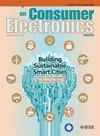An Explainable Recommendation Method for Artificial Intelligence of Things Based on Reinforcement Learning With Knowledge Graph Inference
IF 4.3
2区 计算机科学
Q1 ENGINEERING, ELECTRICAL & ELECTRONIC
引用次数: 0
Abstract
In the realm of consumer electronics, the integration of knowledge graphs with causal inference significantly advances recommendation systems within the Artificial Intelligence of Things (AIoT). This paper introduces a novel method that addresses the limitations of traditional AIoT-based systems, which tend to prioritize correlation over causality and demonstrate limitations in navigating inference paths across knowledge graphs. A reinforcement learning based knowledge graph model is designed to enhance interpretability and trustworthiness in recommendation processes. A soft reward strategy is employed within a Markov decision process, utilizing a multi-hop scoring function to ensure rational outcome assessments. Additionally, a graph search algorithm with user-conditional action pruning is incorporated to facilitate efficient and accurate sampling of inference paths. Experimental results indicate significant improvements in key performance metrics such as normalized discounted cumulative gain, recall, hit ratio, and precision ratio over existing methods. Furthermore, interpretable reasoning paths are provided, establishing a new benchmark in the AIoT-driven recommendation landscape for consumer electronics.一种基于知识图推理强化学习的可解释物联网推荐方法
在消费电子领域,知识图与因果推理的集成极大地推进了人工智能(AIoT)中的推荐系统。本文介绍了一种新的方法,该方法解决了传统的基于人工智能的系统的局限性,这些系统倾向于优先考虑相关性而不是因果关系,并证明了在跨知识图导航推理路径方面的局限性。为了提高推荐过程的可解释性和可信度,设计了一种基于强化学习的知识图模型。在马尔可夫决策过程中采用软奖励策略,利用多跳评分函数来确保合理的结果评估。此外,还结合了用户条件动作修剪的图搜索算法,以促进有效和准确的推理路径采样。实验结果表明,与现有方法相比,该方法在归一化贴现累积增益、召回率、命中率和准确率等关键性能指标上有了显著改进。此外,还提供了可解释的推理路径,为消费电子产品的aiiot驱动推荐领域建立了新的基准。
本文章由计算机程序翻译,如有差异,请以英文原文为准。
求助全文
约1分钟内获得全文
求助全文
来源期刊
CiteScore
7.70
自引率
9.30%
发文量
59
审稿时长
3.3 months
期刊介绍:
The main focus for the IEEE Transactions on Consumer Electronics is the engineering and research aspects of the theory, design, construction, manufacture or end use of mass market electronics, systems, software and services for consumers.

 求助内容:
求助内容: 应助结果提醒方式:
应助结果提醒方式:


